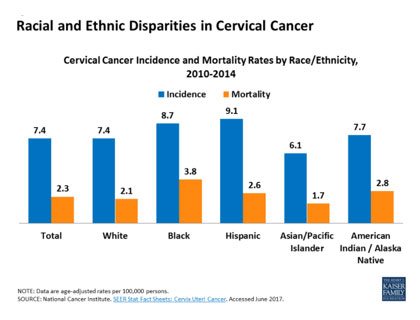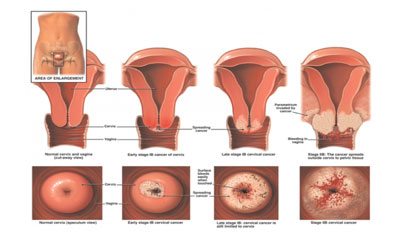January is Cervical Health Awareness Month, and if you’ve resolved to make healthier choices in 2018, ensuring your loved ones are vaccinated against the deadly strains of human papillomavirus (HPV) should be on the top of the “resolutions to keep” list. Cancer prevention is a gift of health for your child’s, and grandchildren’s, future. But it’s only a gift if given early in life.
My journey with HPV began at the age of 17. My very first Pap smear exam had an abnormal result. Over the next several years, I would have some normal and some abnormal Paps, and it was eventually determined that my cervical dysplasia required medical treatment to remove abnormal cell tissue that might become cancerous. I went on to have multiple procedures over the years – a LEEP/cold knife cone, cryosurgery – you name it, I had it. So many painful treatments chipping away precious tissue from my cervix. Currently, the U.S. Preventive Services Task Force recommends screening for cervical cancer in women age 21 to 65 years with Pap smear every 3 years or, for women age 30 to 65 years who want to lengthen the screening interval, screening with a combination of Pap testing and human papillomavirus (HPV) testing every 5 years.
Years later, after my husband and I were married and bought our first house together, we started thinking about starting a family. When pregnancy didn’t happen as quickly as we had hoped, I made a visit to my gynecologist’s office. Back in to the stirrups I go, and with one look heard “Ohhhh…”
My heart sank.
Until we had started trying for a family, I’d had four years of completely normal Pap tests, and I felt confident that I was healthy enough to get pregnant. I couldn’t have been more wrong.
During the course of about 10 months, some cancer switch turned on, and I went from 4 years of a healthy cervix to invasive cervical cancer. About fourteen days after my doctor’s appointment, I was in the hospital having a hysterectomy to save my life from a HPV related cancer. Not only were my husband and I in our 20s trying to deal with the fact we would never have our own biological kids, but now we had the big “C” staring us in the face. To say it was devastating is an understatement.
I wish I could say that I left all of that sadness from nearly 20 years ago behind me, but the reminders of my battle with HPV related cancer is with me every day. When I see my scar or when my legs, ankles and feet swell due to lymphedema from my missing abdominal lymph nodes, it’s clear that I can’t escape what the cancer has done to me. I think about it when I encourage my husband to keep each and every dental exam to ensure that he is not at risk for HPV related oropharyngeal or head and neck cancer. My husband has been an amazing partner sticking with me through all of the intimacy challenges related to the physical modifications to my body, and I only wish we had the opportunity to be protected from HPV when we were younger.
Thankfully, HPV vaccination has now been available and safely administered in the United States for more than a decade. The HPV vaccine is safe, effective and far less painful than any treatment I experienced. It is effective against the 9 strains of HPV which cause the highest number of HPV related cancers. To protect all children from HPV related cancers, the Advisory Committee on Immunization Practices currently recommends routine vaccination for both boys and girls between 11-12 years of age. However, parents may be interested in knowing that girls can get vaccinated as early as age 9 and through age 26. Early vaccination is critical if we are to protect our children before any chance of exposure. Nearly all cases of cervical cancer are caused by infection with oncogenic, or high-risk, types of human papillomavirus, or HPV. There are about 12 high-risk HPV types. Infections with these sexually transmitted viruses also cause most anal cancers; many vaginal, vulvar, and penile cancers; and some oropharyngeal cancers.

According to the National Cancer Institute, HPV infection is very common, most infections will be suppressed by the immune system within 1 to 2 years without causing cancer. These transient infections may cause temporary changes in cervical cells. If a cervical infection with a high-risk HPV type persists, the cellular changes can eventually develop into more severe precancerous lesions. If precancerous lesions are not treated, they can progress to cancer. It can take 10 to 20 years or more for a persistent infection with a high-risk HPV type to develop into cancer.
Stages of cervical cancer

I know enough to understand that as a woman without any children of her own, I shouldn’t try to give advice to any parent, but for anyone hesitating whether it is the right thing to get their family vaccinated against HPV, my questions are these: 1. Do you want your children to be spared the slash, burn, and poison method that is still the method of most standard cancer treatments? 2. Do you want grandchildren? 3. Do you want to sleep well at night knowing you have done all you can to keep your family healthy? If the answer is yes to any one of these questions, then HPV vaccination must be at the top of your resolutions list; make that appointment and immunize them today!
Shaundra Hall, Southwest Regional Director at the National Cervical Cancer Coalition is committed to educating about the detection, treatment and prevention of cervical cancer. To reach her call 602-619-1009 or email shall@nccc-online.org. To learn more about cervical cancer, contact the National Cervical Cancer Coalition (NCCC) by visiting their website at http://www.nccc-online.org.
ABOUT THE NCCC
The NCCC, founded in 1997, is a grassroots nonprofit organization serving women with, or at risk for, cervical cancer and HPV. The NCCC is the only organization dedicated exclusively to helping women address concerns about cervical health and disease. The group executes its mission to improve women’s cervical health outcomes through education, support and advocacy for women and health care providers.
The NCCC supports the nation’s first Cervical Cancer Hotline for women and family members who are battling issues related to cervical cancer. In addition, it promotes patient interaction and support though its Phone Pals and E-Pals Programs, which match cervical cancer survivors with other women who are now living with or have experienced similar circumstances. The NCCC raises awareness nationally through a variety of initiatives, including the Cervical Cancer Quilts Project, a traveling exhibit that puts a personal face on the battle against cervical cancer.
